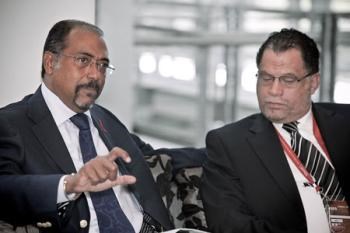HIV/AIDS will be a major issue for FIFA World Cup

Michel Sidibé, UNAIDS Executive Director and Danny Jordaan, CEO of the 2010 FIFA World Cup South Africa Organising Committee discussing using the football event for global outreach on HIV. Photo(c)UNAIDS
16.12.2009
By Kirsten SparreFor many, football and HIV/AIDS may not be immediately connected but the upcoming World Cup will make the link very clear.
First, there is serious concern that some football fans may pick up HIV if they have unprotected sex with one of the many prostitutes in South Africa, half of which are believed to be infected by the virus.
This is a problem that can have consequences beyond the individual.
HIV can be treated with drugs but as Dr. Frederick Veldman, a South African biomedical expert, points out, most strains of the virus are localised and medical staff is used to treating a specific strain of the virus. Bringing back a foreign strain from South Africa can threaten treatment in those countries where HIV and AIDS is already under control.
"International intervention is required. Health authorities should prepare themselves for the influx of a number of individuals that return from South Africa, infected with a "foreign" strain of HIV that could lead to the eventual local manifestation of concoctions of superviruses untreatable by what is currently available on the market," Veldman believes. (Link: 2010 FIFA World Soccer Cup The AIDS Threat)
The threat has already been taking seriously in Holland. South African media have been reporting with some glee that the Dutch State Secretary for Health, Welfare and Sport, Mariette Bussemaker, has urged Dutch fans to bring their own condoms as precautions against HIV infection.
World Cup venues can be prevention centres
The link between football and HIV will be very obvious for a second reason. FIFA is co-operating with a number of organisations that want to take advantage of the World Cup to build awareness about HIV and AIDS.
IRIN/PlusNews reports that at a meeting for health officials and civil society organisations in Johannesburg last month, the chief medical officer for the local organising committee, Dr Victor Ramathesele urged participants to tap into FIFA's marketing expertise to push HIV/AIDS messages before and during the World Cup.
Stadiums, fan parks, hotels and bars could all be potential venues for HIV prevention messages, distribution of condoms and pamphlets as well centres for voluntary counselling and HIV testing.
And in the beginning of December, Danny Jordan, the CEO of South Africa's World Cup organising committee, spoke to UNAIDS, the UN programme on HIV/AIDS, about using the football event for global outreach on HIV.
UNAIDS' website reports that at the meeting Jordan emphasized that the World Cup is about much more than 90 minutes of world-class football in each game.
"As the first developing country to host the event, we must be engaged in the struggle on major issues facing Africa and developing countries worldwide. The first is the battle for minds to fight stigma and discrimination in strengthening the AIDS response, " Jordan said.
No sex worker programmes in place
The World Cup may be an opportunity to build awareness about HIV, but when it comes to dealing with the threat of infection posed by prostitution, very little has been done by the South African government.
"There are actually almost no sex work programmes in place at the moment," Marlise Richter, a sex work researcher and a member of South Africa's National AIDS Council, said at recent consultation process in Cape Town. The process brought together civil society, government and other key players to discuss how to address the risk of HIV in the context of sex work during the World Cup.
In South Africa, it is a crime both to sell and buy sex, and that makes it very difficult to help prostitutes protect themselves and their customers from contracting and spreading the infection.
Richter noted that legalising sex work would make it easier to protect sex workers and their clients from HIV. However, there is not time to pass new legislation legalising prostitution before the World Cup, and therefore campaigners call for a moratorium on arrest of sex workers during the World Cup.
"In a context where sex work is legal and seen as legitimate work, where we have a labour law framework in place, it will mean that sex work will be safer, and that the tourists and clients who come will be safer," Richter told IRIN/PlusNews.
-
fam mark,
US,
11.03.2010 08:32:
During the 90-minute span of a football match, some 400 young people, aged 15 to 24 years old, around the world will be infected with the HIV virus, some 100 children under the age of 15 will die of AIDS, and another 400 will lose their parents to AIDS.





